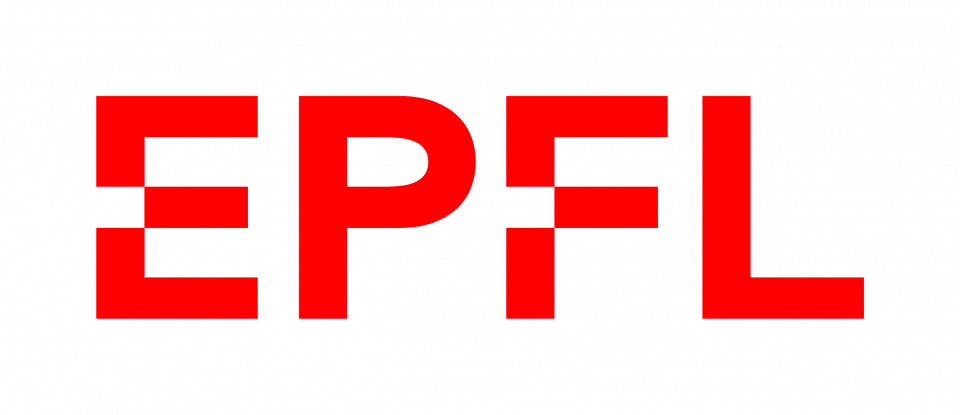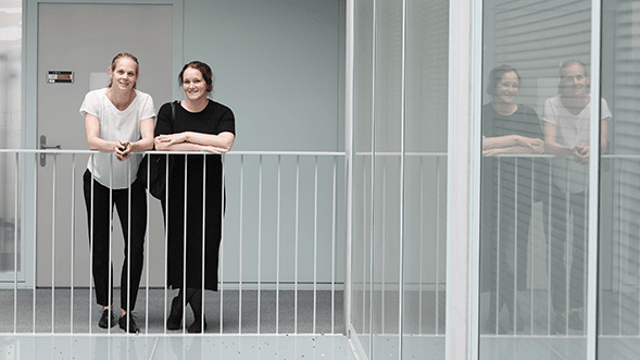SUN bioscience has developed a platform technology for growing organoids that doctors can use to determine the best treatment for a given patient. The company’s revolutionary approach has earned its two founders – EPFL graduates Nathalie Brandenberg and Sylke Hoehnel – a 2022 Alumni Award, which was given out at the Magistrale graduation ceremony.
The story behind SUN bioscience starts with the bond between its two founders. First, Nathalie Brandenberg, who considers herself “made in Vaud” – she’s born and raised in the Canton and earned all her degrees, from Bachelor’s to PhD, at EPFL. She first enrolled here when the School of Life Sciences had just opened and hadn’t yet produced its first graduating class. And second, Sylke Hoehnel, who grew up in the UK and Germany, until her interest in molecular biology brought her to EPFL.
The two met in 2012 while they were both PhD students at the Laboratory of Stem Cell Bioengineering, headed by Prof. Matthias Lütolf. Each student was pursuing her own research, but they teamed up to respond to a request from the Jules Gonin eye hospital in Lausanne to study a potential application for organoids, or tiny organs grown from stem cells that can be used to test different treatment options in vitro. Brandenberg and Hoehnel were so excited about the Jules Gonin project that they ended up working on it in their spare time, alongside their regular thesis research.
That’s when the pair came up with the idea to standardize organoid formation by developing a system for growing and controlling them in a reliable, reproducible manner. That would let doctors obtain better quality data for treating patients. If successful, their system could revolutionize personalized medicine, as it would allow patients suffering from a variety of diseases to receive the treatment best suited to them. What’s more, no human or animal testing would be required.
Once Brandenberg and Hoehnel had their idea, two factors emerged that helped them take it further. The first was the huge potential of the technology they were exploring; it was clear their discovery had to be taken beyond the lab. And the second was the great chemistry between them. They are both perfectionists at heart, they both want to have a direct impact on society, and they get along exceptionally well. Together, they felt they could move mountains. The result was SUN bioscience, where SUN is an acronym of “Sylke und Nathalie.”
The company was established in 2016, but its founders quickly ran into hurdles. “Since our technology was entirely new, there was nothing investors could compare it to,” says Brandenberg. “That made some of them doubtful – a few even said our technology was too ambitious.” But that’s not the only way in which she and Hoehnel broke the mold: the loan agreement for a funding package they received had to be rewritten since it contained only male pronouns. That was the first time this particular funding organization had lent money to a company founded exclusively by women.
Today, the two entrepreneurs are starting to reap the benefits of their hard work. They’ve won several accolades, such as being included on the Forbes 30 Under 30 List in 2016 and receiving the W.A. de Vigier Foundation’s Startup Award in 2018. But it’s their encouraging clinical results that they’re most proud of. Their system was used at Lausanne University Hospital (CHUV) in early 2022, to find a treatment for a cystic fibrosis patient who wasn’t eligible for any form of therapy. “With the organoids grown in our platform, we discovered that one of the treatments initially sidelined could actually be effective for this patient,” says Hoehnel. “Her insurer agreed to cover the cost, and after ten days of treatment, she recovered full use of her lungs – after the disease had reduced her lung capacity to just 60%.”
SUN bioscience has come a long way from its days as a side project in an EPFL lab. The firm currently has nearly 20 employees and around 100 clients, ranging from pharmaceutical companies to healthcare clinics. As pioneers in the development of organoids, Brandenberg and Hoehnel now hope to apply their technology to other diseases, like cancer, and make it available to more clinics and hospitals.
Their journey is an inspiration for today’s students, as reflected in the recently attributed EPFL Alumni Award. What advice would they give to young researchers with an entrepreneurial bent? “Go for it!”, says Brandenberg. “Bear in mind that every step you take – both your successes and your failures – bring you ever closer to your goal.” Hoehnel adds: “There’s no better place than Switzerland, and especially EPFL, to create your own business.”

Comments0
Please log in to see or add a comment
Suggested Articles



